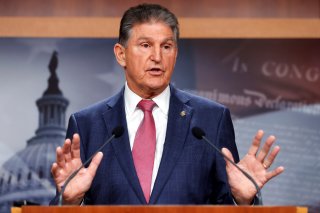Did Joe Manchin Just Kill Joe Biden’s Child Tax Credit?
Manchin believes that Congress should have better oversight over where the money goes.
With his controversial decision to oppose President Joe Biden’s $1.75 trillion “Build Back Better” bill, Sen. Joe Manchin (D-W.Va.) has effectively ended hopes that the measure would be passed in its current form. While some critics, particularly on the Democratic Party’s progressive wing, have denounced Manchin for breaking trust with Biden and other Democratic leaders, others, more hopeful, have suggested that the senator could be talked around to a revised version of the bill after Congress’s holiday break.
If another version of the Build Back Better bill is put forward, then it will probably exclude the proposed 2022 extension of the expanded Child Tax Credit, which raised the amount a family received for each child from $2,000 per year to $3,000 or $3,600, depending on the child’s age. Although the bill has been credited with halving childhood poverty, it is also one of the most expensive pieces of the legislation and has been attacked by Republicans as being anti-work.
In a Monday interview with MetroNews, a West Virginia radio station, Manchin outlined his opposition to the measure, claiming that it needed to be changed to make the payments “accountable.” To do this, Manchin proposed that it included a work requirement.
The senator suggested that an income cap for the credit, above which it would not be applied, should be lowered. Such a cap has been set very high in the past, allowing, among others, billionaire Amazon CEO Jeff Bezos to claim it for his four children in 2011, on the basis that his six-figure nominal income fell below the cap.
“Do you believe people making $200,000 and $400,000 should still get the child tax credit the same as someone making $50,000, $60,000, or $70,000 that really needs it?” Manchin asked MetroNews host Hoppy Kercheval, citing the credit’s proposed upper-income caps ($200,000 for parents filing individually, $400,000 for filing jointly). At these levels, a family’s credit would gradually decrease, but would not go away altogether until a higher level still.
To resolve these issues, the program should be more highly targeted, and Congress should be obligated to “make sure the money follows a child,” Manchin said during the interview. For instance, there should be a way to ensure that the money is paid to whoever was raising the child, rather than their biological parents if custody shifted.
The Huffington Post also reported that Manchin also suggested that Manchin had argued to his Senate colleagues that poorer families would spend the payments on drugs, citing anonymous sources.
Trevor Filseth is a current and foreign affairs writer for the National Interest.
Image: Reuters

